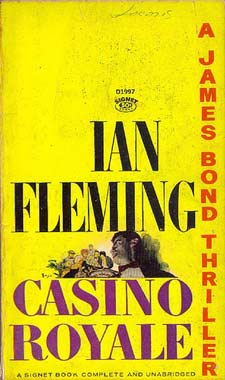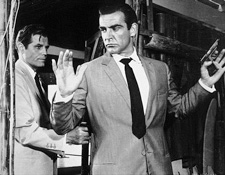 I was about twelve years old when a nearby library system held a “big tent” book sale. My parents, knowing me well, drove me some distance to get there, and then set me loose. It was a hot day, but the tent provided shade for me and the tables upon tables upon tables of battered, sometimes yellowing paperbacks. I still remember the smell of warm, dusty books. I think I ended up with two boxes full of mystery and suspense novels at about a nickel each. The only books I remember from that haul, however, are Ian Fleming ’s James Bond novels.
I was about twelve years old when a nearby library system held a “big tent” book sale. My parents, knowing me well, drove me some distance to get there, and then set me loose. It was a hot day, but the tent provided shade for me and the tables upon tables upon tables of battered, sometimes yellowing paperbacks. I still remember the smell of warm, dusty books. I think I ended up with two boxes full of mystery and suspense novels at about a nickel each. The only books I remember from that haul, however, are Ian Fleming ’s James Bond novels.


I imagine you’re wondering what my parents thought of my choice of these books. In fact, they didn’t even look through the boxes. They never restricted what I read, I guess assuming I wouldn’t choose anything too adult; as for me, I took everything I read in stride, though I was glad not to be asked. As you can imagine, the James Bond novels represented an unusual experience for a pre-teen girl.
To me, James Bond was alien; more alien to me, in fact, than literally alien heroes of the science fiction I’d read. For instance, he had a limited, boring wardrobe and was very particular about his habits. He smoked, which to me meant he smelled nasty. I didn’t understand yet that these things were meant to be the epitome of masculine cool, because I didn’t share the cultural milieu of the intended audience (male, 1950s to 1960s). To me, those traits were character flaws I had to ignore in order to enjoy the stories.
And enjoy them I did. I loved that Bond wasn’t always completely successful in his missions. The fact that he made mistakes, was horribly injured, and sometimes got the wrong people killed, engaged my sympathies on his behalf. I loved the mystery of his naval career, and that the books gave only hints of his pre-spying past. Most of all, I identified with his solitude and loneliness, his constant feeling of being set apart by his duties and his experiences. Despite the misogyny of the novels, I found common experience between an embittered British spy and an American pre-teen girl.

My love for the books wasn’t perfect, however. I was sometimes taken aback by the violence of the plots, and that was the other major influence the Bond novels had on me: they encouraged me to think about violence, and when and how it might be felt necessary or justified, and how violent actions can affect not only the victims but the perpetrators. I’m not sure Ian Fleming had that in mind, but that’s what a classic genre novel can do, and I think that’s why those books are still read today. The implication and influence of the stories goes far beyond the adventure plot.
I haven’t re-read the Bond novels in at least a couple of decades. Sometimes I wonder if I should, or if I should let them live in my memory, instead.
Images via Your Neighborhood Librarian and Springvale Library .
Victoria Janssen is the author of three erotic novels and numerous short stories. Her latest novel is The Duke and The Pirate Queen from Harlequin Spice. Follow her on Twitter: @victoriajanssen or find out more at victoriajanssen.com.

Really enjoyed this.
I was about that age when I discovered Travis McGee, and I can totally relate to your experience. I didn’t get to Bond until much later, but only because I raided my father’s shelves first, and he read John D. Macdonald, not Ian Flemming.
@ElizabethAWhite – Thanks!
@LauraKCurtis – I’ve considered re-reading the Travis McGee books – I think they might hold up a little better for me than Bond.
Clearly you forgot GOLF. Golfinger has so much golf!